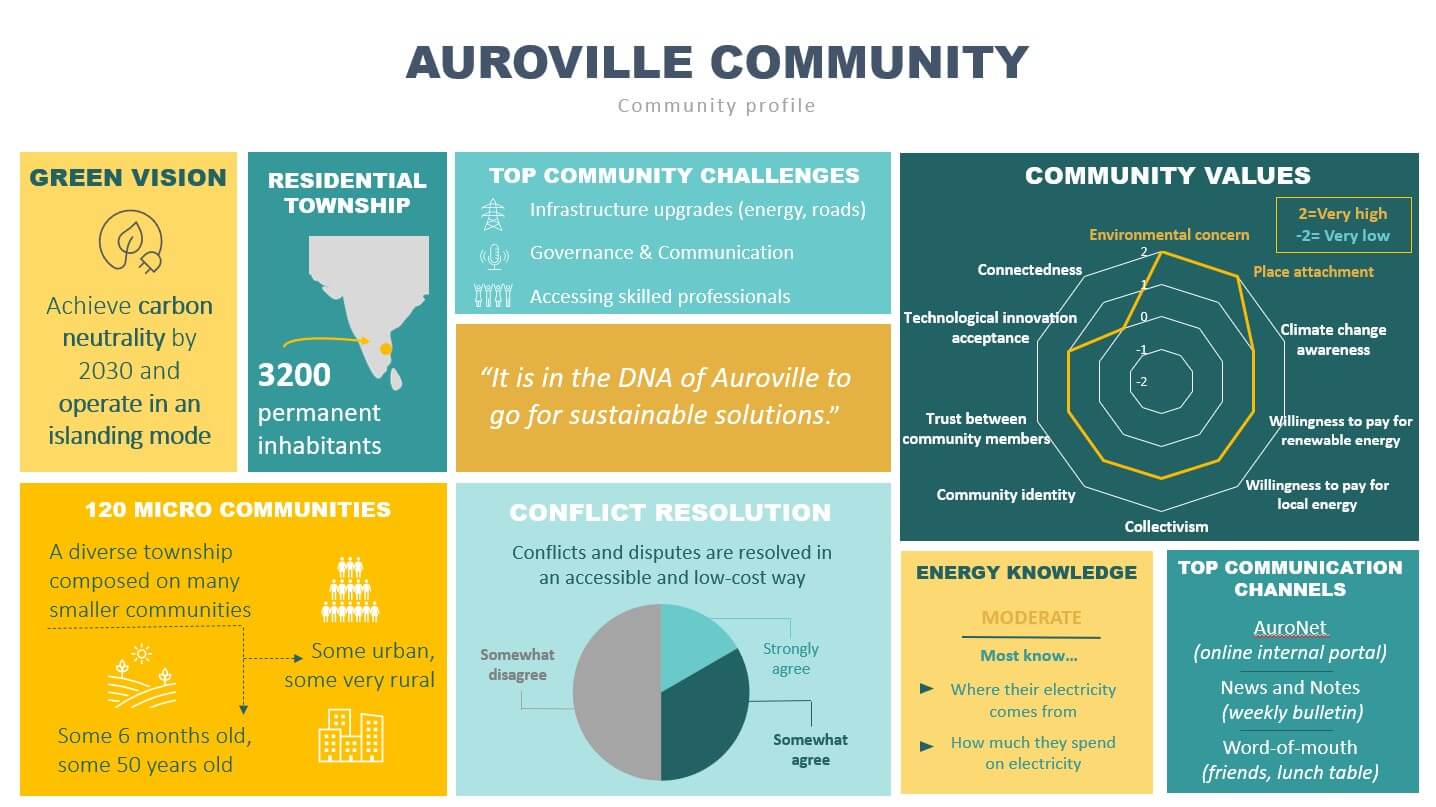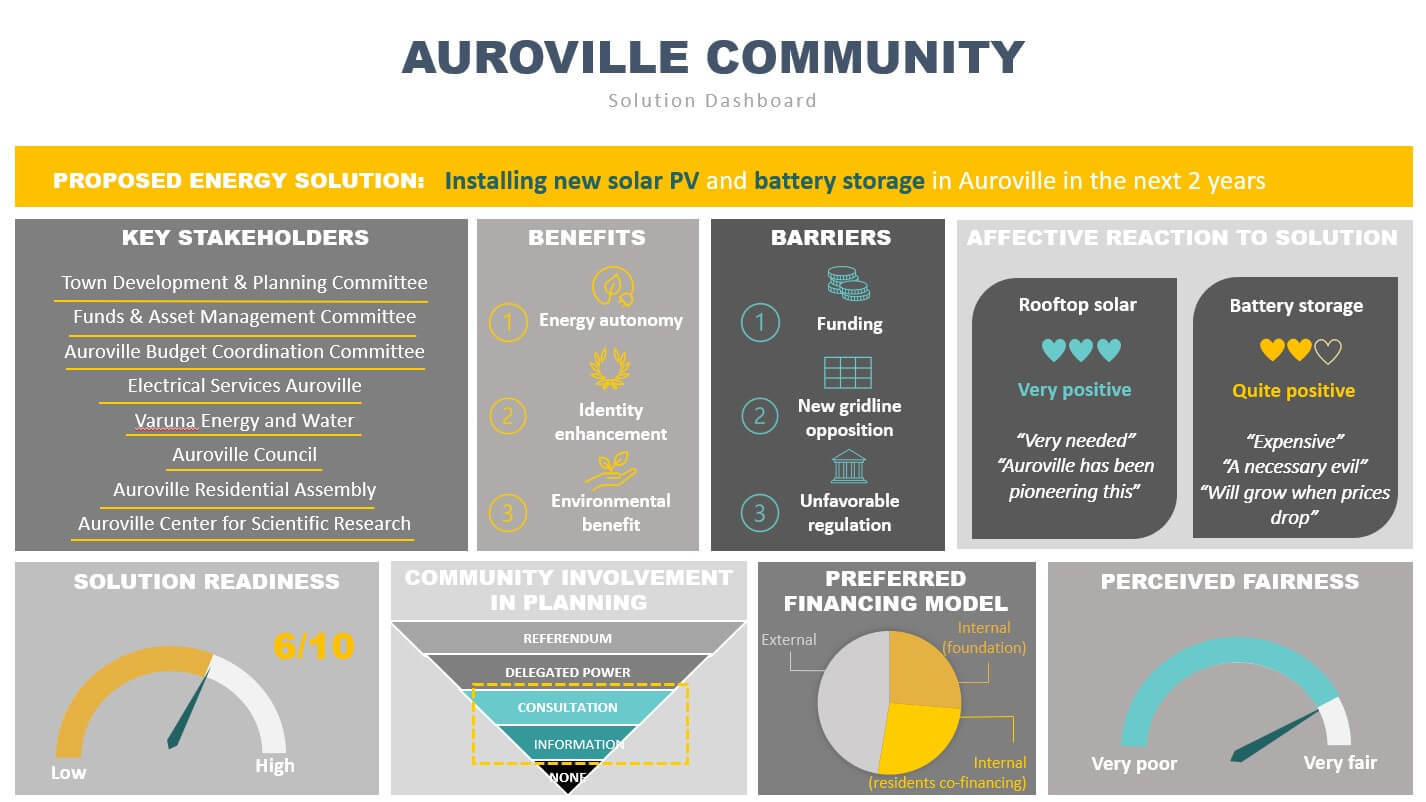Making green energy aspirations a reality in India: How the E-LAND community engagement methodology is supporting the development of energy communities
By Beatrice Petrovich, University of St. Gallen, and Bonnie Murphy, GECO Global 4. November 2021
Since the mid-1960s, the township of Auroville in Southern India has been striving for sustainable living and the realization of human unity in diversity. In 1966, UNESCO commended it as a project of importance to the future of humanity. “It is in the DNA of Auroville to go for sustainable solutions,” said Aurovillians after being accepted as one of the 5 pilot locations of the E-LAND project. Truly sustainable living for Aurovillians also means achieving carbon neutrality and sourcing 100% of electricity demand from local renewable sources.
“. [As] Auroville is in forefront of sustainable development and power sector transformation, we thought this is a great opportunity to collaborate and be part of the E-LAND,“ says Jaswanth Yaddala, Project Manager and renewable energy expert at Auroville Consulting.
In Auroville, the power quality issues (low voltage) and outages are regular. Moreover, export of surplus to the grid is currently not permitted and they need to integrate locally installed, distributed renewable energy generation and storage. “The city of Auroville is facing different energy-related challenges,” explains Jaswanth.
Aligning on a green energy vision
The E-LAND toolbox will help Auroville implement its green energy vision. Together with the E-LAND team, Auroville Consulting, the local pilot partner in Auroville, has explored innovative solutions to find the optimum renewables and energy storage capacity mix to limit the export to the grid, provide reliable power supply, decarbonize Auroville’s electricity demand and reduce the cost of supply.
While ITC tools support the technology-related decisions by simulating the investments necessary for becoming self-sufficient for their community energy needs, the E-LAND Community engagement methodology – the Common Impact Model – has facilitated the acceptance of new clean energy among different local stakeholders.
“A good solution needs support from multiple stakeholders at different levels, so including them from planning and designing make everyone be on the same page and work for a unified solution“ – Jaswanth Yaddala, Auroville Consulting.
Through the application of the CIM methodology, the E-LAND Community Building team interviewed local stakeholders and mapped the key community’s values, priorities, and practices, that should guide the design and planning of new energy solutions. The CIM’s inclusive energy infrastructure planning approach takes into account local stakeholders’ rational and emotional reactions to proposed energy solutions, thereby helping to adapt the project design and communication accordingly.

Building community involvement in innovative solutions
Together with the local pilot partner, the E-LAND Community Building team co-created three community engagement recommendations designed to overcome the barriers to successful and long-lasting adoption of innovative solutions for clean and local energy generation in Auroville. Over the next months, innovative and participatory funding options for local solar rooftop PV and battery storage will be explored in a workshop with local financial authorities, a series of short informative posts on the local intranet will address energy knowledge gaps and a “pilot-to-policy” workshop will showcase E-LAND work in Auroville to state government officials and the local energy utility. The main takeaway from the community engagement work conducted so far? “Ideas and ideology are different but all are looking at the same vision which in turn will help to make things simpler if we work together,” answers Jaswanth.

Today, thanks to distributed renewable energy sources and micro-grids, also other cities, towns, industrial districts, and rural communities can follow the example of Auroville and generate the energy they need using clean and local energy sources. Local production of renewable electricity and heat not only helps mitigate climate change but also supports the local economy and empowers the community. With its unique mix of technical, business innovation, and community tools, the E-LAND toolbox can help choose the right technology for realising decarbonized local energy systems and support the acceptance of the new clean energy infrastructure among different local stakeholders.
Social media
E-LAND updates

The E-LAND project aims to develop and demonstrate tools for energy systems to overcome the technical, business, and societal challenges associated with the creation of… (1 year ago)

E-LAND exploitation enhancement activities kickstarted for the final project year Multiple events were executed and many more are planned for the E-LAND project’s final year.… (2 years ago)

A central pillar of the E-LAND project's is risk management. The Norwegian consortium member, Institute for Energy Technology (IFE), implemented a risk management approach to… (2 years ago)

E-LAND H2020 is working with creating a toolbox that is designed to optimize and control multi-energy islands and isolated communities. The toolbox is structured in… (2 years ago)

Smart Innovation Norway together with the University of St. Gallen have developed a series of workshops that began in June 2021 and focused on the… (2 years ago)

About the pilot site: Port of Borg is situated in an industrial area on a small peninsula called Øra just outside Fredrikstad, Norway. Port work… (2 years ago)

Since the mid-1960s, the township of Auroville in Southern India has been striving for sustainable living and the realization of human unity in diversity. In… (2 years ago)
